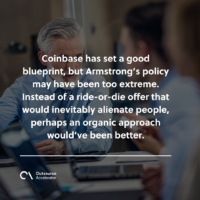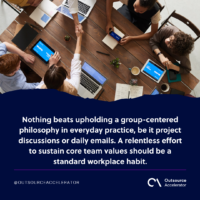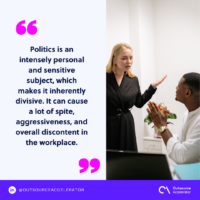No longer taboo
It’s campaign season in America again, and political debates in the streets are spilling into office spaces.
A Glassdoor report revealed that three in five U.S. office workers have discussed politics with colleagues over the past year. This trend reflects a shift away from the traditional view of the office as a place where political differences are set aside for shared goals.
This has raised alarms among managers and the C-Suite as these heated conversations are adversely affecting workplace harmony.
Lessons from Coinbase
In 2020, cryptocurrency exchange platform Coinbase was under fire for its handling of political discussions in the office. Its CEO, Brian Armstrong, offered a severance package to employees unwilling to accept the firm’s new policy of not discussing political issues that are “unrelated to work.”
While Armstrong detailed in his blog that the new policy was a measure to reinforce a team-first approach, it was nonetheless perceived as an outright ban on all political conversations and the curtailment of free speech.
The criticisms are warranted. Coinbase has set a good blueprint, but Armstrong’s policy may have been too extreme. Instead of a ride-or-die offer that would inevitably alienate people, perhaps an organic approach would’ve been better.
The ultimate professional
Introducing a new policy is good, but continuously reiterating a team-first attitude is even better. Monthly meetings and the occasional town halls are ideal avenues for highlighting this message.
However, nothing beats upholding a group-centered philosophy in everyday practice, be it project discussions or daily emails. A relentless effort to sustain core team values should be a standard workplace habit.
Politics is an intensely personal and sensitive subject, which makes it inherently divisive. It can cause a lot of spite, aggressiveness, and overall discontent in the workplace.
The firm’s job is to create a conducive work environment where teams are united and winning is the prime objective. Meanwhile, employees should show their cooperation by becoming ultimate professionals.
This means leaving whatever personal or political baggage they have out the door before booting their computers. Talking about politics, religion, and sex is ok, provided that employees know how to read the room, are moderate, and are non-confrontational.
Professionalism isn’t just about maintaining a high standard of responsibility and integrity. It also means interacting with one’s colleagues in a civil and respectful manner.
The question for your business
How are you handling political discussions in the workplace?
Read more thought leadership articles here:




 Independent
Independent





















